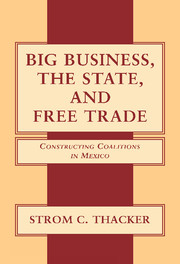Book contents
- Frontmatter
- Contents
- List of Figures
- List of Tables
- List of Abbreviations
- Acknowledgments
- 1 Introduction: International Context, Domestic Interests, and Mexican Trade Reform
- 2 Coalition Politics and Free Trade
- 3 Structural Power Relations Between Business and the Mexican State
- 4 Trade Policy Coalitions in the 1980s
- 5 Assembling Teams and Building Bridges
- 6 Business Participation in the NAFTA Negotiations
- 7 Conclusion: Mexico in Comparative Perspective
- Appendix
- References
- Index
4 - Trade Policy Coalitions in the 1980s
Published online by Cambridge University Press: 12 January 2010
- Frontmatter
- Contents
- List of Figures
- List of Tables
- List of Abbreviations
- Acknowledgments
- 1 Introduction: International Context, Domestic Interests, and Mexican Trade Reform
- 2 Coalition Politics and Free Trade
- 3 Structural Power Relations Between Business and the Mexican State
- 4 Trade Policy Coalitions in the 1980s
- 5 Assembling Teams and Building Bridges
- 6 Business Participation in the NAFTA Negotiations
- 7 Conclusion: Mexico in Comparative Perspective
- Appendix
- References
- Index
Summary
INTRODUCTION
Coalitions provide the critical link between structure, politics, process, and policy outcomes. Trade policy coalitions are cross-cutting state-society alliances that band together to promote or obstruct certain trade policies. The level of the state's trade policy coalition members varies, from the rank of Secretary or cabinet member down to middle-level bureaucrats. Private sector participation ranges from business organization leaders, to sectoral representatives, to directors or employees of individual companies. Maxfield's (1990) general definition serves as a useful starting point: “Policy currents or alliances are defined as loose coalitions of public and private sector actors brought together by the desire to push for or against a particular policy” (29). I adapt these ideas to define trade policy coalitions as formal or informal alliances of public and private sector actors joined together by shared interests to support or oppose certain kinds of trade policies.
This chapter identifies two competing business-state trade policy coalitions: the protectionist coalition and the free trade coalition. Adopting such a definition risks oversimplifying trade preferences. Most actors' policy interests are more complex than such a simple dichotomy would seem to permit. Interests can change over time, and a certain amount of gray area lies between the ideal types of complete protection and pure free trade. A concerned industrialist, for example, might support a limited liberalization of some products, but not of others. To cite an extreme case, a garment manufacturer might prefer to have textiles and fabrics (his inputs) liberalized, while apparel (his output) is protected, thereby conferring upon him high rents.
- Type
- Chapter
- Information
- Big Business, The State, and Free TradeConstructing Coalitions in Mexico, pp. 77 - 124Publisher: Cambridge University PressPrint publication year: 2000



